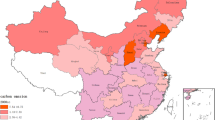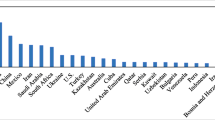Abstract
Taking industrial waste gas control as an example, this study explores the impact of fiscal decentralization on the efficiency of local governments’ environmental governance under the pressure of competition, and analyzes the role of competition among local governments and support for R&D activities. The results demonstrate that fiscal decentralization can significantly promote the efficiency of local governance on control of waste gas, and this positive effect is mainly realized through the support from local government for R&D activities. As for the influence of inter-governmental competitions, only the competition in terms of governance efficiency delivers a significant U-shaped impact, and competition in expenditure scale and economy area weakly inhibits the positive influence of decentralization, meaning that the evaluation system centered on economic growth and the imitation strategy of local expenditure will not lead to a great decline in the efficiency of the use of environmental governance. Overall, this study suggests that further fiscal decentralization, emphases on government support for R&D activities, and enhanced environmental assessment in official evaluation are all the important directions for boosting the efficiency of governance.
Similar content being viewed by others
Data availability
Data generated and/or analyzed during this research are available upon request from the corresponding author.
References
Acemoglu D, Johnson S, Robinson J et al (2003) Institutional causes, macroeconomic symptoms: volatility, crises and growth. J Monet Econ 50(1):49–123
Andersson L, Aronsson T, Wikström M (2004) Testing for vertical fiscal externalities. Int Tax Public Financ 11(3):243–263
Ang BW (1999) Is the energy intensity a less useful indicator than the carbon factor in the study of climate change? Energy Policy 27(15):943–946
Angelopoulos K, Philippopoulos A, Tsionas E (2008) Does public sector efficiency matter? Revisiting the relation between fiscal size and economic growth in a world sample. Public Choice 137(1):245–278
Arrow KJ (1962) Economic welfare and the allocation of resources to invention. Princeton University Press, Princeton
Besley T, Case A (1995) Incumbent behavior vote-seeking, tax-setting, and yardstick competition. Am Econ Rev 85(1):25–45
Blundell W, Evans MF, Stafford SL (2021) Regulating Hazardous Wastes under US Environmental Federalism: The Role of State Resources. J Environ Econ Manag 108:102464
Borge LE, Falch T, Tovmo P (2008) Public sector efficiency: the roles of political and budgetary institutions, fiscal capacity, and democratic participation. Public Choice 136(3–4):475–495
Brueckner JK (2003) Strategic interaction among governments: an overview of empirical studies. Int Reg Sci Rev 26(2):175–188
Brueckner JK (2004) Fiscal decentralization with distortionary taxation: Tiebout vs. Tax Competition. Int Tax Public Financ 11(2):133–153
Charnes A, Cooper WW, Rhodes E (1978) Measuring the efficiency of decision making units. Eur J Oper Res 2(6):429–444
Chen Y, Ebenstein A, Greenstone M et al (2013) Evidence on the impact of sustained exposure to air pollution on life expectancy from China’s Huai River Policy. Proc Natl Acad Sci 110(32):12936–12941
Cheng Z, Zhu Y (2021) The spatial effect of fiscal decentralization on haze pollution in China. Environ Sci Pollut Res 2021:1–14
Christl M, Köppl-Turyna M, Kucsera D (2020) Determinants of public-sector efficiency: decentralization and fiscal rules. Kyklos 73(2):253–290
Chung YH, Färe R, Grosskopf S (1997) Productivity and undesirable outputs: a directional distance function approach. J Environ Manage 51(3):229–240
Chupp BA (2011) Environmental constituent interest, green electricity policies, and legislative voting. J Environ Econ Manage 62(2):254–266
Coase RH (1960) The problem of social cost. In: Gopalakrishnan C (ed) Classic Papers in Natural Resource Economics. Palgrave Macmillan, London. https://doi.org/10.1057/9780230523210_6
Czarnitzki D, Licht G (2006) Additionality of Public R&D Grants in a Transition Economy. Econ Transit 14(1):101–31
Da Cruz NF, Marques RC (2014) Revisiting the determinants of local government performance. Omega 44:91–103
De Borger B, Kerstens K (1996) Radial and nonradial measures of technical efficiency: an empirical illustration for Belgian local governments using an FDH reference technology. J Prod Anal 7(1):41–62
Fan F, Cao D, Ma N (2020) Is improvement of innovation efficiency conducive to haze governance? Empirical evidence from 283 Chinese cities. Int J Environ Res Public Health 17(17):6095
Färe R, Grosskopf S, Lovell CAK et al (1989) Multilateral productivity comparisons when some outputs are undesirable: a nonparametric approach. Rev Econ Stat 90–98
Feng T, Du H, Lin Z et al (2020) Spatial spillover effects of environmental regulations on air pollution: evidence from urban agglomerations in China. J Environ Manag 272:110998
Geys B, Heinemann F, Kalb A (2010) Voter involvement, fiscal autonomy and public sector efficiency: evidence from German municipalities. Eur J Polit Econ 26(2):265–278
Giordano R, Tommasino P (2013) Public-sector efficiency and political culture. FinanzArchiv/Public Finance Analysis 289–316
Gordon RH (1983) An optimal taxation approach to fiscal federalism. Q J Econ 98(4):567–586
Grisorio MJ, Prota F (2015) The impact of fiscal decentralization on the composition of public expenditure: panel data evidence from Italy. Reg Stud 49(12):1941–1956
Gu Y, Ayala Garcia J (2021) Educational expenditure efficiency in China: the role of the governor’s characteristics. Appl Econ 53(25):2832–2847
Hauptmeier S, Mittermaier F, Rincke J (2012) Fiscal competition over taxes and public inputs. Reg Sci Urban Econ 42(3):407–419
Joumard I, Kongsrud PM, Nam YS, Price R (2004) Enhancing the effectiveness of public spending: experience in OECD countries. OECD Economics Department Working Papers. No.380
Kalb A, Geys B, Heinemann F (2012) Value for money? German local government efficiency in a comparative perspective. Appl Econ 44(2):201–218
Levinson A (2003) Environmental regulatory competition: a status report and some new evidence. Natl Tax J 56(1):91–106
Li C, Li G, Li Z (2019) The threshold effect of the efficiency of science and technological services on regional environmental governance in China. Growth Chang 50(3):1026–1042
Managi S, Kaneko S (2006) Economic growth and the environment in China: an empirical analysis of productivity. Int J Glob Environ Issues 6(1):89–133
Mao Y (2018) Decentralization, national context and environmental policy performance: a fuzzy set qualitative comparative analysis. Environ Sci Pollut Res 25(28):28471–28488
Marlow ML (1988) Fiscal decentralization and government size. Public Choice 56(3):259–269
Morduch J, Sandler T (1997) A Tale of Two Collectives: Sulfur Versus Nitrogen Oxides Emission Reduction in Europe. Economica 64(254):281–301
Munsif R, Zubair M, Aziz A et al (2021) Industrial air emission pollution: potential sources and sustainable mitigation. Environmental Emissions. IntechOpen
Oates WE (1968) The theory of public finance in a federal system. Can J Econ 1(1):37–54
Oates WE (1999) An essay on fiscal federalism. J Econ Lit 37(3):1120–1149
Peng B, Li Y, Wei G et al (2018) Temporal and spatial differentiations in environmental governance. Int J Environ Res Public Health 15(10):2242
Peter SH (2003) Who will pay? Coping with aging societies, climate change, and other long-term fiscal challenges. International Monetary Fund. WWPCEA
Revelli F (2003) Reaction or interaction? Spatial process identification in multi-tiered government structures. J Urban Econ 53(1):29–53
Sigman H (2002) International spillovers and water quality in rivers: do countries free ride? Am Econ Rev 92(4):1152–1159
Stewart RB (1977) Pyramids of sacrifice? Problems of federalism in mandating state implementation of national environmental policy. Yale Law J 86(6):1196–1272
Stiglitz J (1988) Economics of the Public Sector. New York, W.W, Norton and Company
Tanzi V, Schuknecht L (2000) Public Spending in the 20th Century: A Global Perspective. Cambridge University Press
Tiebout CM (1956) A pure theory of local expenditures. J Polit Econ 64(5):416–424
Van der Kamp D, Lorentzen P, Mattingly D (2017) Racing to the bottom or to the top? Decentralization, revenue pressures, and governance reform in China. World Dev 95:164–176
Willardsen K (2021) Measuring fiscal interactions in local federalism: Evidence from Florida. Pap Reg Sci 100(4):891–923
Wilson JD (1999) Theories of tax competition. Natl Tax J 52(2):269–304
Wright GD, Andersson KP, Gibson CC et al (2016) Decentralization can help reduce deforestation when user groups engage with local government. Proc Natl Acad Sci 113(52):14958–14963
Wu M, Cao X (2021) Greening the career incentive structure for local officials in china: does less pollution increase the chances of promotion for Chinese local leaders? J Environ Econ Manag 107:102440
Wu H, Li Y, Hao Y et al (2020) Environmental decentralization, local government competition, and regional green development: evidence from China. Sci Total Environ 708:135085
Xia S, You D, Tang Z et al (2021) Analysis of the spatial effect of fiscal decentralization and environmental decentralization on carbon emissions under the pressure of officials’ promotion. Energies 14(7):1878
Xiang Z, Ming L (2016) The Impacts of Pollution on People’s Political Attitude in China. China Econ Q 2016(4):1409–1438
Xiaowei C (2018) Air pollution from industrial waste gas emissions is associated with cancer incidences in Shanghai, China. Environ Sci Pollut Res 25(13):13067–13078
Acknowledgements
The author gives sincere thanks to Hongsheng Fang for his guidance and valuable suggestions, which have provided great help in improving the manuscript, and also thankful to the support and funding from the Zhejiang Provincial Leading Group for the Development and Planning of Philosophy and Social Sciences.
Funding
This research is funded by Zhejiang science and technology project (16NDZB01ZD), “A Study on Countermeasures of Simultaneous Development of Supply Side and Demand Side in Zhejiang’s Economic Development.”
Author information
Authors and Affiliations
Contributions
Mingxue Xu: conceptualization, methodology, formal and empirical analysis, original draft writing, and resources.
Corresponding author
Ethics declarations
Ethical approval and consent to participate
Not applicable.
Consent to publish
Not applicable.
Competing interests
The author declares no competing interests.
Additional information
Responsible Editor: Nicholas Apergis
Publisher's note
Springer Nature remains neutral with regard to jurisdictional claims in published maps and institutional affiliations.
Supplementary Information
Below is the link to the electronic supplementary material.
Rights and permissions
About this article
Cite this article
Xu, M. Research on the relationship between fiscal decentralization and environmental management efficiency under competitive pressure: evidence from China. Environ Sci Pollut Res 29, 23392–23406 (2022). https://doi.org/10.1007/s11356-021-17426-1
Received:
Accepted:
Published:
Issue Date:
DOI: https://doi.org/10.1007/s11356-021-17426-1




